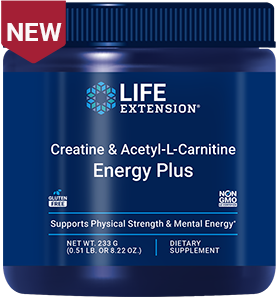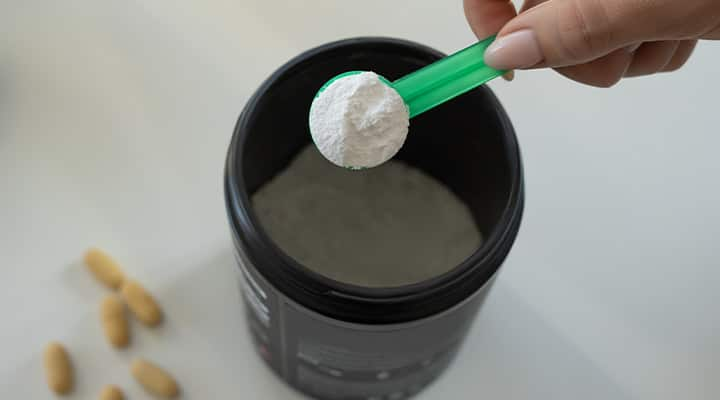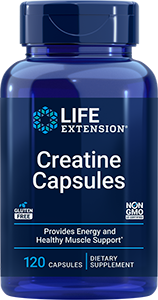
Creatine Capsules vs. Powder: Which Is Better?
Published: January 2025
Creatine supplements have been around since the 1990s, and for good reason. It's one of the supplements we "got right" in the sports performance space. Since then, creatine has been consistently studied and repeatedly shown to be effective for athletes and exercise performance, and recent research shows benefits to overall health and aging as well.
Creatine, a naturally occurring amino acid, supports sports performance by encouraging healthy muscle function. But creatine supplementation also helps support:
- Healthy energy metabolism
- Maintaining muscle mass
So, the benefits of creatine supplementation go far beyond the weight room.
What is the best way to take creatine?
Creatine can be found in various meats, fish and milk. However, most individuals (including women) will need to supplement to reach the necessary dose for creatine to be effective. Once ingested, creatine is stored in your muscles and brain, and it plays an important role in producing energy in almost all tissues, as well as supporting muscle function and muscle mass.
There is no "best way" to supplement with creatine monohydrate. Ultimately, it is whatever is more convenient for the individual. The most important thing when supplementing with creatine is taking it every day, and for most people, that can be difficult.
I suggest pairing your creatine powder or capsules with a habit you already do on a daily basis. For example, I supplement with creatine either in my morning coffee on non-training days or in my pre-workout drink on training days. These two habits help me be consistent about my creatine supplementation.
When comparing creatine capsules vs. powder, you don't need to pick one over the other. They could both have their place in your supplement routine. You could use the powder form at home, where it's convenient to mix into a smoothie with other health-promoting ingredients, and keep capsules at your workplace or in your gym bag to supplement on the go.
For how much and when to take creatine, the recommendation is 3-5 g daily. You might have heard about "creatine loading," but loading is not necessary. Research shows creatine stores top off in about 28 days with a daily dose of 3-5 g. Loading may be beneficial for an upcoming athletic event, but it isn't necessary. Instead, creatine should be taken long-term.
Creatine Supplement Pros and Cons
Interested in adding creatine to your daily routine? This breakdown can help you decide which form is right for you:
Creatine Powder
PROS: Creatine in powder form is the most popular supplement method thanks to its versatility and ability to get the full dosage easily. You can mix creatine powder with almost any beverage without any unwanted taste. It mixes well in a pre-workout drink, morning cup of coffee or post-workout whey protein powder shake. The other big pro to using creatine powder is the ability to get a full dosage in 1-2 scoops.
CONS: The cons of creatine powder are its grainy texture, having to mix it into a drink, and possibly altering the taste of a beverage. While these might not seem significant to you, they may be for someone else. For example, you may be having a busy day and forget to take your creatine until after a large meal, when you're full, and the idea of drinking a smoothie is distasteful.
Creatine Capsules
PROS: Capsules can be convenient since you do not need to mix them into a drink and simply need to swallow them. This is great when you are on the go and need to supplement. With capsules, there is no taste or grainy texture since the creatine monohydrate is encapsulated. This may be a determining factor for you between creatine powder or capsules.
CONS: The biggest downside to capsules is the amount of capsules needed. The recommended 3-5 g is a fairly large amount of powder, which must be fit into multiple capsules. For someone who does not like taking capsules or simply cannot swallow them, this might rule out the capsule form.
Explore Our Best Active Lifestyle & Fitness Supplements
Which form of creatine absorbs better, powder or capsules?
Both creatine powder and capsules undergo the same process to be absorbed into the muscle tissue. The powder may be absorbed quicker because the body does not have to break down the capsules, but the difference is not significant enough to merit consideration. The best approach is to pick whatever form you prefer and whichever will lead you to supplement daily. Both capsules and powder can have a place in your supplement routine. What is important is remembering to take it every day.
What to do while taking creatine
When supplementing with creatine monohydrate or other fitness supplements, you will get the most benefits by making healthy lifestyle choices. These include:
Daily exercise.
One of the main benefits of creatine monohydrate is its support in helping to build muscle through resistance training. Muscle mass is a big indicator of quality of life (sitting, standing, walking), and as we age, we are at risk of losing muscle strength. Creatine supplementation paired with resistance training can help promote muscle growth, potentially improving your quality of life.A balanced diet.
Without proper nutrition, your body will not be in an optimal environment for muscle growth. It is important to focus on eating minimally processed whole foods with an emphasis on lean proteins, fruits, vegetables and whole grains. A great reference for this is the Mediterranean diet, which leans heavily on those elements.Healthy hydration.
A common myth of creatine monohydrate is that it dehydrates you. The interesting thing about creatine is that when it's stored in the muscle, it pulls water in with it. This water is stored intracellularly. Now, if we aren't consuming enough fluids, there may not be enough water to be stored with creatine or available for the other important roles water plays in our body. This is why you should stay hydrated when supplementing with creatine.Adequate sleep.
Healthy sleep goes far beyond supplementing with creatine. We want a healthy lifestyle, and sleep is a major part of this. The research is clear that adequate sleep can encourage brain performance, mood, and energy levels, which are key to the exercise performance that creatine supports.
Curious about supplementing to support a healthy and active lifestyle? Our health needs quiz can help guide your decisions with a personalized nutritional recommendation.
References
- Davies TW, et al. "Creatine supplementation for optimization of physical function in the patient at risk of functional disability: A systematic review and meta-analysis." JPEN J Parenter Enteral Nutr. May 2024. https://pubmed.ncbi.nlm.nih.gov/38417175/
- Desai I, et al. "The Effect of Creatine Supplementation on Resistance Training-Based Changes to Body Composition: A Systematic Review and Meta-analysis." J Strength Cond Res. July 2024. https://pubmed.ncbi.nlm.nih.gov/39074168/
- Hall M, et al. "Creatine Supplementation: An Update." Curr Sports Med Rep. July 2021. https://pubmed.ncbi.nlm.nih.gov/34234088/
- Kreider RB, Stout JR. "Creatine in Health and Disease." Nutrients. January 2021. https://pmc.ncbi.nlm.nih.gov/articles/PMC7910963/
- Ribeiro F, et al. "Timing of Creatine Supplementation around Exercise: A Real Concern?" Nutrients. August 2021. https://pmc.ncbi.nlm.nih.gov/articles/PMC8401986/
- "Creatine." Cleveland Clinic. April 2023. https://my.clevelandclinic.org/health/treatments/17674-creatine#when-to-call-the-doctor
Always be in the know!
Access the latest deals, wellness news, expert health tips & more!









